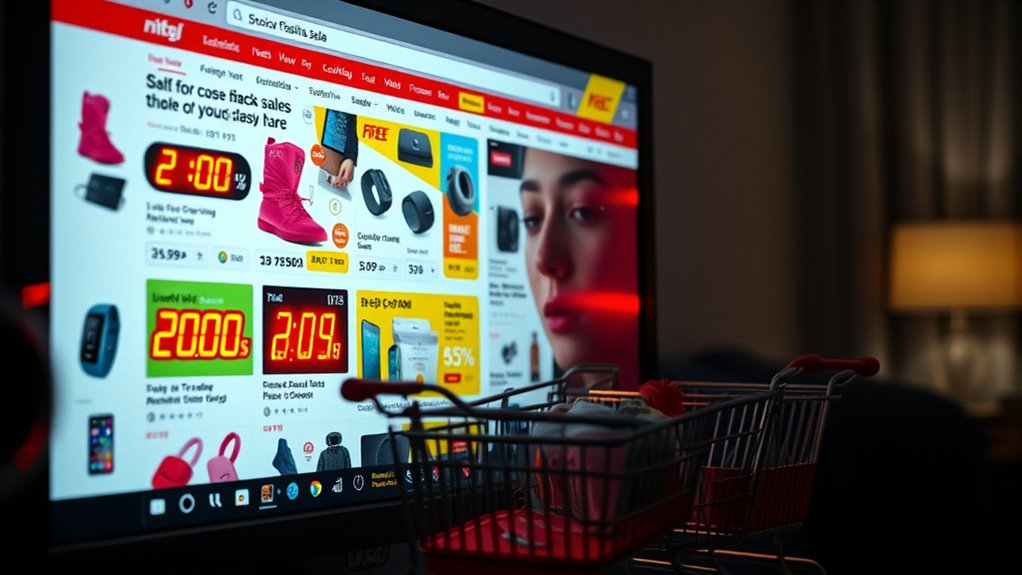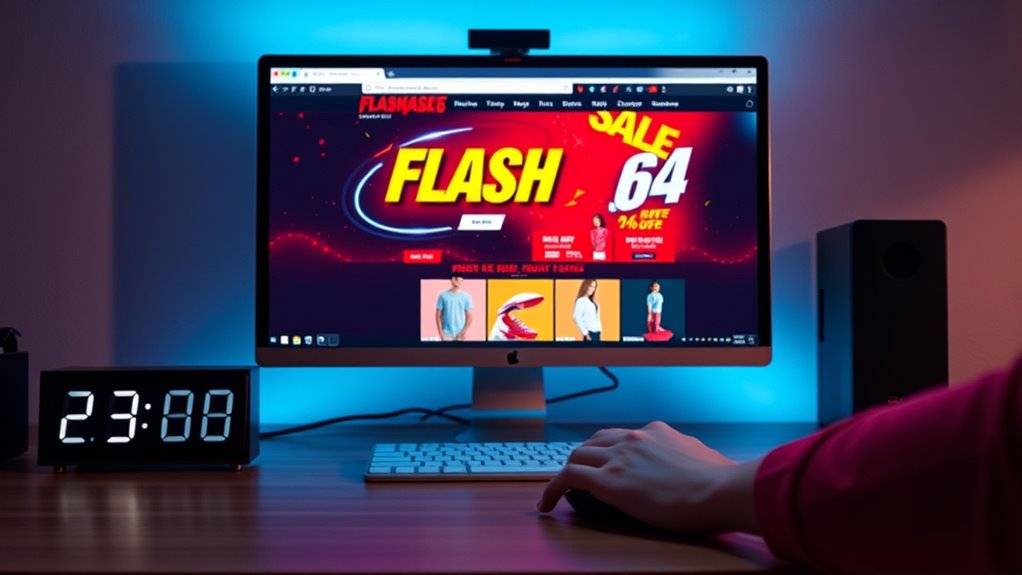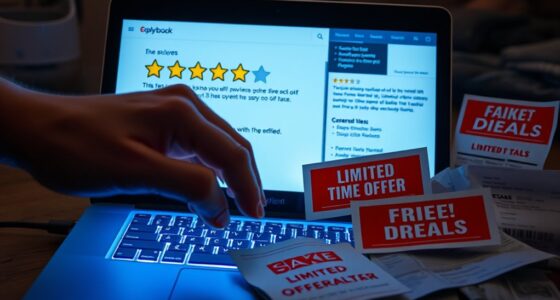To avoid impulse buys on flash-sale sites, understand how they create urgency with limited-time deals and countdowns. Set a strict budget before browsing, and stick to it. Use a wishlist to organize desired items, and wait at least 24 hours before purchasing to evaluate if you really need them. Limit browsing time and recognize signs of emotional or impulsive decisions. Staying aware helps you make smarter choices—keep going to discover more ways to stay in control.
Key Takeaways
- Set a clear budget and stick to it to prevent overspending during flash sales.
- Use a wishlist and wait 24 hours before purchasing to assess if the deal is necessary.
- Limit browsing time with timers or website blockers to reduce impulsive clicking.
- Compare prices across multiple sites to ensure you’re getting the best deal and avoid unnecessary buys.
- Be mindful of emotional triggers like FOMO or excitement, and pause to evaluate if the purchase is truly needed.
Understand How Flash-Sale Sites Operate

Flash-sale sites operate by offering limited-time discounts on popular products, creating a sense of urgency that encourages quick purchases. When you visit these sites, you’ll notice countdown timers or notifications of limited stock, which push you to act fast. They often feature daily or hourly deals, making it seem like you’re missing out if you don’t buy immediately. These sites rely on the excitement of snagging a deal before it’s gone, which can lead to impulsive decisions. They typically showcase a curated selection of products, discounted considerably to attract attention. By understanding this setup, you can recognize the tactics used to trigger urgency and make more mindful choices instead of rushing into purchases just because a deal seems irresistible. Additionally, being aware of psychological tactics used in marketing can help you resist impulsive buying impulses. Recognizing the influence of market volatility in promotional strategies can also help you stay composed and avoid unnecessary spending. Moreover, understanding how product presentation influences perception can help you evaluate deals more critically.
Set a Budget Before Browsing

Before you start browsing flash-sale sites, it’s important to set a clear budget to avoid overspending. Decide how much money you’re willing to spend overall and stick to it. Break that amount into categories, like essentials, treats, and emergencies, to stay balanced. Use the table below to plan your limits:
| Category | Budget Amount | Priority |
|---|---|---|
| Essentials | $50 | High |
| Treats | $20 | Medium |
| Emergency | $30 | Low |
Implementing automated savings contributions can help you stay within your budget and prevent impulse buys. Being aware of cookie usage and managing your preferences can also help you avoid unnecessary distractions while shopping. Understanding emergency preparedness essentials can guide you in prioritizing which items are truly necessary during sales. Additionally, regularly reviewing your software quality assurance metrics can help you identify areas where your spending habits may need adjustment to better align with your financial goals. Recognizing the importance of time management can also prevent last-minute impulsive purchases.
Create a Wishlist for Future Purchases

Creating a wishlist for future purchases helps you stay organized and avoid impulsive buys during flash sales. When you add items you’re interested in, you create a clear list of what truly matters to you. This keeps you focused and prevents you from buying something just because it’s on a limited-time deal. By reviewing your wishlist before a sale begins, you can prioritize items based on your needs and budget. It also helps you resist the temptation of impulse buys, as you already know what you want and don’t need to add anything extra. Keep your wishlist updated regularly, removing items you no longer want. This way, you’ll make thoughtful decisions and avoid unnecessary spending during those fleeting flash sale moments. Incorporating analytics tools into your purchasing strategy can help identify your actual shopping habits and prevent unnecessary spending. Understanding your purchase patterns enables you to make smarter choices and stick to your budget. Additionally, being aware of cookie preferences can help you manage how your browsing data is used, further supporting your mindful shopping approach. Furthermore, practicing mindfulness techniques like deep breathing exercises can help you stay calm and focused, reducing the likelihood of impulsive purchases.
Wait Before Making a Purchase Decision

Taking a moment to pause before making a purchase can save you from unnecessary spending and buyer’s remorse. When you see a deal, resist the urge to buy immediately. Instead, consider these steps:
- Set a waiting period—wait 24 hours before committing. This delay helps prevent impulsive decisions driven by emotional triggers and gives you time to evaluate if the purchase is truly necessary. Recognizing the potential pitfalls of new payment technologies can also help you make more informed decisions. Additionally, understanding skincare patch application can encourage more mindful choices about health-related products. Incorporating knowledge of proper paint preparation techniques can also aid in assessing whether a project is worth pursuing or if you’re acting on temporary enthusiasm.
- Compare prices across different sites or stores.
- Evaluate your needs—is this item essential or just a fleeting desire?
- Check for alternatives—are there better options available?
- Reflect on your purchase—consider how the item aligns with your well-being and long-term goals.
Recognize the Signs of Impulsive Buying

You might feel a sudden urge to buy something without thinking it through, especially when an emotional trigger hits. Ignoring your budget limits can make impulsive purchases seem tempting in the moment. Recognizing these signs helps you avoid regret later.
Sudden Urge to Purchase
The moment you feel an intense urge to buy something unexpectedly, it’s often a sign of impulsive shopping taking over. Recognizing this sudden urge helps you stay in control. Ask yourself:
- Are you buying this just because it’s a limited-time deal?
- Do you feel anxious or excited, like missing out would be worse?
- Are you making the purchase without much thought or research?
- Do you regret it immediately after clicking “buy”?
- Are you experiencing feelings of vulnerability or emotional triggers that influence your decision? Dynamic communication exercises can help manage these impulses by fostering self-awareness and emotional regulation. Being aware of impulse triggers such as emotional states or marketing tactics can further improve your resistance to unnecessary purchases. Additionally, understanding passive voice detection can aid in clearer, more direct communication that reduces confusion or misinterpretation during decision-making processes. Recognizing the linguistic features involved in advertising language can also help you identify manipulative tactics that encourage impulsive buys.
If any of these apply, your impulse is likely driving your decision. That rush of excitement or fear of missing out can push you to buy things you don’t really need. Becoming aware of these signs is the first step to resisting impulsive purchases.
Emotional Triggers at Play
Emotional triggers often drive impulsive buying, catching you off guard when feelings like happiness, stress, or boredom take over. You might notice yourself feeling suddenly excited or restless, leading to a desire to shop as a way to boost your mood. Alternatively, stress or frustration can push you toward making quick purchases as a form of comfort. Boredom might also trigger you to browse and buy just to fill the void. Recognizing these signs is essential; if you find yourself shopping to escape negative emotions or chasing fleeting happiness, it’s a clear signal that emotions are influencing your decisions. Being aware of these triggers helps you pause and evaluate whether your purchase is genuinely needed or just an emotional response. Additionally, understanding emotional triggers in shopping can help you develop healthier habits and avoid unnecessary expenses.
Ignoring Budget Limits
Have you ever noticed how quickly your shopping spree spirals out of control when you ignore your budget limits? It’s easy to get caught up in the excitement and forget to set boundaries. Recognizing this is key to avoiding impulsive buys. Here are some signs you’re ignoring your budget:
- You make multiple purchases without checking your total spending.
- You feel the need to buy just because a deal seems too good to pass up.
- You’re frequently exceeding your planned budget during sales.
- You buy items you don’t really need, just to take advantage of discounts.
Use Price Comparison Tools

Using price comparison tools can considerably boost your chances of finding the best deals on flash-sale sites. These tools quickly scan multiple retailers, revealing whether a deal is truly worth it or if a better price exists elsewhere. They save you time and prevent impulse purchases by providing clear price histories and current offers. To illustrate, here’s a quick comparison:
| Store A | Store B |
|---|---|
| $50 | $45 |
| 6 months ago | 2 weeks ago |
| No reviews | 4-star reviews |
| Free shipping | $5 shipping fee |
Limit Your Browsing Time

Setting time limits on your browsing sessions helps prevent endless scrolling and impulsive purchases. To stay in control, try these strategies:
- Set a specific timer for each browsing session, like 10 or 15 minutes.
- Use website blockers or extensions to restrict access after your time is up.
- Prioritize your shopping list beforehand to avoid aimless browsing.
- Log out of your accounts after browsing to remove easy access and reduce temptation.
Avoid Shopping When Emotional or Impatient

Browsing mindlessly when you’re feeling emotional or impatient can lead to unnecessary purchases and regret. When you’re upset, stressed, or in a rush, your judgment weakens, making it easier to click “buy now” without thinking. Impulse decisions driven by emotion often result in buyer’s remorse later. To avoid this trap, recognize your emotional state before shopping. Take a deep breath, step away from your device, and wait a few minutes. Use this pause to assess whether you really need the item or if you’re just seeking a quick fix for your feelings. Shopping when calm and collected helps you make rational choices, saving you money and reducing regrets. Remember, emotional impulses are fleeting; patience is your best defense.
Sign Up for Alerts to Avoid Last-Minute Deals

Signing up for alerts helps you stay ahead of last-minute deals before they expire. Enable notification alerts so you get instant updates, and set deal reminders to plan your purchases wisely. This way, you avoid rushing and making impulsive decisions at the last minute.
Subheading 1: Enable Notification Alerts
To make certain you never miss out on exclusive deals, it’s essential to enable notification alerts from flash-sale sites. These alerts keep you informed about upcoming sales, preventing last-minute rushes. Here’s how to make the most of notifications:
- Subscribe to push notifications on your smartphone or browser for instant alerts.
- Customize alert preferences so you only receive notifications for products you’re interested in.
- Enable email alerts for daily summaries or special promotions.
- Set quiet hours to avoid distractions during non-shopping times.
Subheading 2: Set Deal Reminders
Setting up deal reminders guarantees you don’t miss out on limited-time offers. By signing up for alerts, you receive notifications straight to your inbox or phone, keeping you informed about upcoming sales. This way, you can plan your purchases without feeling pressured or rushed at the last minute. Use calendar alerts or dedicated shopping apps that send reminders ahead of deal deadlines. Set multiple alerts if needed, especially for high-value or desired items. These reminders help you stay disciplined, preventing impulsive buys triggered by sudden flash sales. Taking control of your notifications ensures you’re aware of deals without constantly checking sites. Ultimately, deal reminders make shopping more strategic, helping you buy only what you need and avoid unnecessary impulse purchases.
Reflect on Your Purchases to Prevent Regret

Reflecting on your purchases after a flash sale can help you avoid future regret. Take a moment to evaluate:
- Did you really need the item? Consider if it solves a problem or enhances your life.
- Was it a good deal? Compare the price to regular retail to determine if you saved genuinely.
- How often will you use it? Be honest about whether it’s a fleeting desire or a lasting necessity.
- Were you influenced by impulse? Recognize if emotions or sales tactics led to the purchase.
Frequently Asked Questions
How Can I Identify Genuine Discounts From Flash-Sale Sites?
When you’re shopping online, it’s easy to get tempted by discounts. To spot genuine deals, compare prices on other sites first, and check if the discount is significant compared to regular prices. Look for transparent pricing info and beware of limited-time offers that pressure you into quick decisions. If a deal seems too good to be true, do some research to verify its authenticity before clicking “buy.”
Are There Specific Times When Flash Sales Are More Frequent?
You might notice flash sales tend to happen more often during holidays, seasonal changes, or special shopping events like Black Friday or Cyber Monday. Retailers often time these sales to boost sales during peak shopping periods. To avoid impulsive buys, plan ahead and mark these key times on your calendar. Stay alert for early notifications or emails, so you can shop intentionally rather than impulsively during these high-frequency sale periods.
What Psychological Tricks Do Flash-Sale Sites Use to Encourage Impulse Buying?
You might notice that flash-sale sites use psychological tricks to push you into impulse buying. They create a sense of urgency with countdown timers, making you think you’ll miss out if you don’t act quickly. Limited stock messages and exclusive deals make you feel special and compelled to buy. Additionally, they use bright colors and bold fonts to grab your attention, nudging you towards quick decisions without much thought.
Can Setting Alerts Help Me Avoid Overspending on Flash-Sale Sites?
Like Icarus flying too close to the sun, setting alerts helps you avoid reckless spending. When you get a notification, you’re reminded to pause and evaluate whether the purchase is necessary. Alerts act as a safeguard, giving you space to think beyond the immediate urge. By using them consistently, you can maintain control, prevent impulse buys, and make smarter, more intentional decisions on flash-sale sites.
How Do Return Policies Affect My Decision to Purchase During Flash Sales?
You should consider return policies carefully before buying during flash sales because they directly impact your confidence in making quick decisions. If a site offers flexible, clear return policies, you’re more likely to feel secure about purchasing, knowing you can return items if needed. Conversely, strict or complicated return policies might make you hesitant, encouraging more thoughtful decisions and helping you avoid impulse buys during these limited-time deals.
Conclusion
By understanding how flash-sale sites work and following these tips, you can dodge impulse buys like a savvy merchant of Venice. Set a budget, wait before purchasing, and recognize your triggers. Remember, even the most tempting deal isn’t worth losing your treasure chest of savings. Stay disciplined, limit browsing, and reflect on your choices. With these habits, you’ll outsmart the flash sales and keep your coins safe—no need to call upon your inner Robin Hood!









